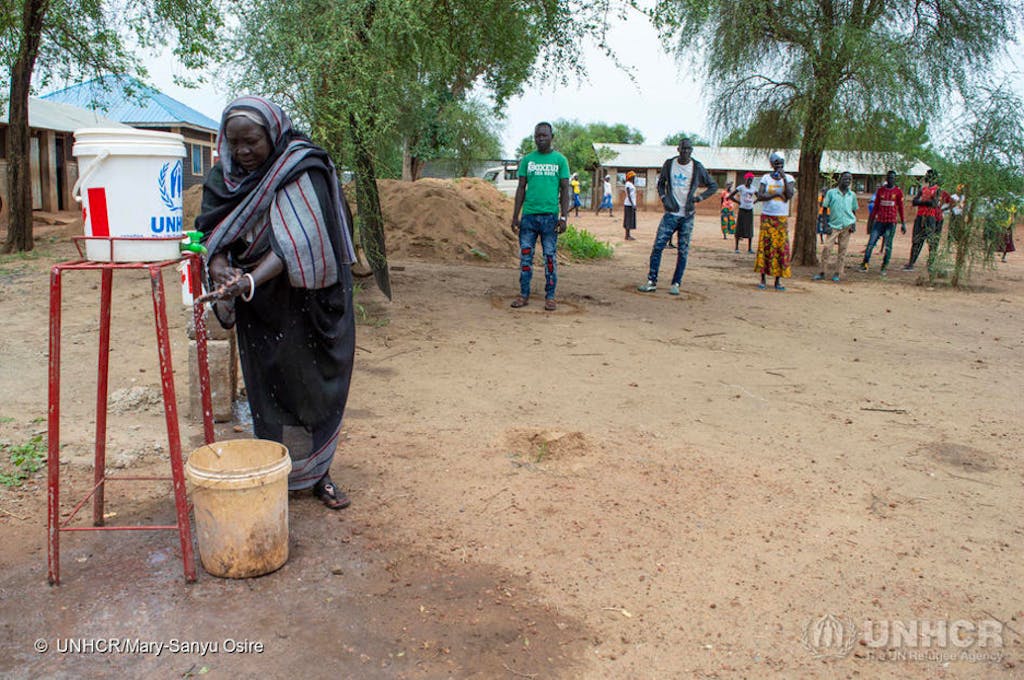The COVID-19 Solidarity Response Fund supports the world’s most vulnerable during the pandemic through partners like the UN Refugee Agency. In one South Sudan refugee camp, youths compose songs to raise awareness about COVID-19 prevention.
The pulsating sound of drumbeats pierces the air in Doro refugee camp, located in northeastern South Sudan. Women, men, and children dance in the Jamhuri primary school, in sync with the rhythm.
As visitors enter the gate, they are serenaded with a song: “We, we, we are all — we are all happy today. Our visitors, we invite — we invite you to share with us.”

Volunteers direct the guests to hand-washing stations. A large banner with information on COVID-19 hangs in full view. As they line up, each person is instructed to stand in the middle of circles marked on the ground, drawn 1 meter apart per World Health Organization (WHO) guidance at the start of the pandemic.
Once they’ve finished washing their hands, the guests are directed to chairs, also spread 1 meter apart. There are mats, too — also spaced out with the same distance.
When all the chairs and mats are full, the show kicks off.
With a harp resting against his chest, 30-year-old Yahya sways from side to side as he leads a group of youths singing in Jumjum, one of the local dialects. The first song is titled “Bonga,” written in honor of the Bonga mountain in the Blue Nile — the region in Sudan that the refugees call home. The refugees perceive Bonga to be indestructible.
“We are like Bonga. But if we do not shelter ourselves from coronavirus, it will claim many lives. Coronavirus is like a black cloud and heavy rain,” the group sings. “It will not spare anyone without shelter. We must be careful. We must protect ourselves from this disease by avoiding handshaking and maintaining physical distancing.”
The songs are part of a community mobilization session organized by the youth committee, which is composed of representatives from the different tribes living in the camp.
As of October, there are no confirmed cases of COVID-19 at the camp, but South Sudan has seen a rapid increase in the number of people who have contracted the virus since the pandemic was first reported in the country in April.
“Many humanitarian organizations talked to us about the new coronavirus. When we understood the gravity of the situation, we sat down as the youth committee and decided to start this campaign. As the youth, we have a role to play in bringing the community together and mobilizing them,” said 25-year-old Thomas, chairperson of the youth committee.
He adds: “We sing in local languages because some of our people do not understand English or Arabic. Songs attract people, and when they listen to what we are saying, they realize it has a deeper meaning.”
So far, the group has composed eight songs in local dialects spoken across the sprawling Doro camp, which hosts more than 63,000 people representing about three dozen tribes. As they move from one location to another, the musicians change their language to match what is spoken.
“When we are done reaching out to refugees, we will start sensitizing the host community. We are one with them. We play sports together and shop at the same places,” said Thomas.
In South Sudan, where the COVID-19 outbreak represents yet another challenge that risks overshadowing the preexisting humanitarian needs of the most vulnerable people, the COVID-19 Solidarity Response Fund contribution is crucial. Thanks to this funding, UN Refugee Agency (UNHCR) activities in response to the current situation are strengthened, including health assistance in clinics and hospitals in different refugee hosting areas of the country, which the host community can also access.
YOU CAN HELP
Every action counts in the fight against COVID-19. By supporting the COVID-19 Solidarity Response Fund, you can help continued efforts to fight the coronavirus and protect the lives of refugees around the world. The Fund is the fastest and most effective way for individuals, companies, and organizations to support the work of the World Health Organization and its partners in battling the virus.
This piece was provided by UNHCR’s Mary-Sanyu Osire and has been edited and published with permission.



 View All Blog Posts
View All Blog Posts